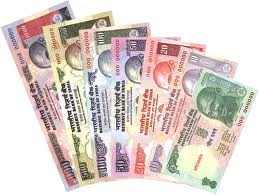As the Indian rupee falls to its worst level since 1991, not everyone is sad, especially the billionaire brothers Shashikant and Ravikant Ruia, who are hoping to profiti from the plunge as they recast $4.3 billion in Essar Group debt.
The plan to replace as much as 70 percent of 370 billion rupees ($6.1 billion) of liabilities at Essar Oil Ltd. (ESOIL) and Essar Steel India Ltd. with dollar borrowings by March 2014 would cut interest expenses by about 7 percentage points, according to V. Ashok, the group’s chief financial officer. The rupee’s 10.6 percent tumble this quarter means Essar needs to borrow fewer dollars to repay rupee obligations, increasing cost savings to more than $300 million a year, he said.
“This is the perfect time to do the debt conversion,” Mumbai-based Ashok said in an interview yesterday. “Currency weakness is an advantage for us. The dollar liability will be much less right now with the rupee being so weak. We are looking at dollar loans, not bonds.”
The recast started as Essar Steel, which failed to pay overseas bondholders in 1999 in the first foreign-debt default by an Indian company, said June 20 that it raised $1 billion in loans this month. The average yield on Indian dollar notes was 5.33 percent, HSBC Holdings Plc data show, compared with 8.80 percent on five-year AAA rupee corporate securities.
Repaying local-currency loans, which typically require collateral, with unsecured dollar liabilities would free up assets pledged to domestic banks by the companies, increasing room for more borrowings, according to SJS Markets Ltd.
“The current scenario certainly opens up the possibility to raise less dollar debt than a year ago for the same amount of rupee debt,” Hemant Dharnidharka, the Bangalore-based head of credit research at SJS Markets, said in an interview yesterday. “The refinancing not only repays the Indian lenders, it also unencumbers the company’s assets. This leaves elbow room for management to raise more debt later if needed.”
The rupee slid 7 percent this month alone, Asia’s worst performer. It weakened 1.7 percent yesterday to 60.73 a dollar and touched an all-time low of 60.765. The currency’s one-month implied volatility surged 337 basis points since May 31 to 12.6 percent, signaling a greater potential for losses. Traders quote the gauge, a measure of expected swings in exchange rates, as part of options prices.
Essar Oil and Essar Steel earn most of their income abroad and that means their foreign-currency debt isn’t vulnerable to exchange-rate fluctuations, said Ashok. The reorganization of borrowings would increase the average maturity of the firm’s liabilities to as much as seven years from less than four years now, he said. Essar Ports Ltd. (ESRS) also may consider switching to dollar obligations in the future, according to Ashok.
“Most of Essar Oil’s expenses are in rupees and revenue in dollars,” Alok Deshpande, Mumbai-based energy analyst with Elara Securities Ltd., said in an interview yesterday. “So they are in a good spot with rupee depreciation operationally too.”
The Essar group is also in talks with lenders from China for raising funds, Ashok said, without giving details. Reliance Communications Ltd. (RCOM), controlled by billionaire Anil Ambani, said last year it would borrow $1.18 billion from Chinese banks to meet a convertible debt repayment.
“We are at the drawing-board stage with various options for foreign-currency loans,” said Ashok. “Chinese banks are very interested in Indian assets, so we are looking at that as well. The group strategy in the two largest companies, Essar Oil and Essar Steel, is to dollarize their balance sheets since their revenues are dollar-linked or dollar-denominated.”
Indian companies raised $18.8 billion from foreign-currency bonds and loans this year, up from $9.5 billion a year ago, as borrowing costs at home remained relatively higher. The Reserve Bank of India’s 7.25 percent repurchase rate is the highest among Asia’s biggest economies even after Governor Duvvuri Subbarao cut it three times this year. Similar rates are at 3 percent in China and 6 percent in Indonesia. (IDBIRATE)
Ten-year (GIND10YR) sovereign debt in India pays 7.58 percent, compared with 2.56 percent in the U.S. and 3.49 percent in China. The yield on the 7.16 percent government debt due May 2023 surged eight basis points in Mumbai yesterday, offering an extra 504 basis points over Treasuries.
Bond risk for Indian companies has dropped in the past year. The average cost of five-year credit-default swaps insuring against non-payment by seven local issuers declined 90 basis points to 310, according to data provider CMA, which is owned by McGraw-Hill Cos. and compiles prices quoted by dealers in privately negotiated markets.
The convertible bonds of Essar Energy Plc (ESSR), which holds a 15.5 percent stake in Essar Oil, have gained this year amid optimism the debt recast will help improve the group’s finances. The 4.25 percent notes due 2016 of the Indian refiner and power producer advanced 15 percent since Dec. 31, reducing the yield by 379 basis points to 12.11 percent, Barclays Plc prices show.
“Things are looking up again for Essar Oil,” Elara’s Deshpande said. “There is the obvious saving on interest costs with this exercise. Its parent company, Essar Energy, is listed in London and that too should give the group easier access to foreign funds.”

